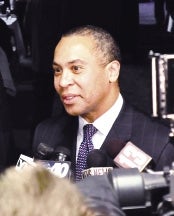Political leaders usually campaign with great fervor on economic growth. If they happen to win, economic conditions, which for the most part are beyond their control, can become an albatross that could send them packing the next time voters go to the polls. Timing counts for a lot, both in business and in politics, and many capable leaders have had to pay the price when external conditions headed downward.
After eight years in office, Deval Patrick’s tenure as governor ends this week. He came into office in 2006, a time of economic highs, and was able to withstand the effects of a devastating national recession and the emergence of the Tea Party to win re-election in 2010. Any political leader that makes it back for a second term in the state’s highest office deserves more of the credit, and carries more of the blame for what has happened during his tenure.
As he hands the keys to Charlie Baker this week, Patrick leaves the statehouse after having delivered on many economic growth initiatives, while missing on others. Here’s where he deserves due credit:
LIFE SCIENCES — In 2008, Patrick launched a 10-year, $1 billion program to advance the industry in Massachusetts, focusing especially on technological investment, research funding and aligning educational offerings with the industry’s demand for the right skillsets from its workers. This investment has helped establish Boston as the U.S. magnet for life sciences, and has also benefited Central Massachusetts.
GATEWAY CITIES — Patrick made investment in the state’s older industrial cities — including Worcester, Leominster and Fitchburg — a priority to help position them for the industries of tomorrow. Worcester has been a notable beneficiary, receiving millions of dollars to upgrade parks and infrastructure, as well as to convert “brownfields” sites into active use.
DRUMMING UP FOREIGN BUSINESS — The governor racked up quite a few air miles over eight years, talking up the Bay State in Israel, Mexico, China and Panama among his many trade missions. The results are noteworthy. Several Israeli companies have opened offices in Massachusetts, including Argo Medical Technologies of Marlborough. The outreach has also helped the Massachusetts Port Authority add 11 nonstop international flights from Logan International Airport, with Mexico City and Beijing among the new destinations.
TRANSPORTATION — With the help of his former lieutenant governor, Tim Murray, Patrick expanded the use of commuter rail on the Worcester-Framingham line, while the Fitchburg line is being extended west to Gardner. Off the rails, the governor gets a “B” for at least recognizing the subpar condition of the state’s roads and bridges, an important issue given businesses’ need to move goods and enhance access for their employees. While the governor and lawmakers have been at odds over how to spend the money he has proposed, the fact remains that the infrastructure needs upgrades; 19 percent of the state’s major roads were in poor shape and 43 percent of its bridges were functionally obsolete, according to a 2013 quadrennial report by the American Society of Civil Engineers.
ENERGY — Not all of Patrick’s energy policies have made him the darling of business interests, but he can take much of the credit for the massive push to increase the state’s use of renewable energy. Massachusetts ranks second behind California in clean energy technology, and first in investment activity and policy, according to industry research firm Clean Edge Inc. The administration cited double-digit growth in the number of clean energy-industry jobs.
However, Patrick’s record on taxation is mixed. The corporate income tax dropped from 9.5 percent to 8 percent during his tenure, while the sales tax rose from 5 to 6.25 percent in 2009 in part to deal with the revenue hole opened by the Great Recession. The Bay State still ranks in the middle of the pack on business friendliness, with a bottom-five ranking among the states in the costs of doing business.
As Patrick prepares to leave the Statehouse this week, he carries with him a reasonably admirable record of accomplishment for Massachusetts’ business sector, which is not bad for someone from the wing of a political party that has been traditionally considered unfriendly to business interests.

